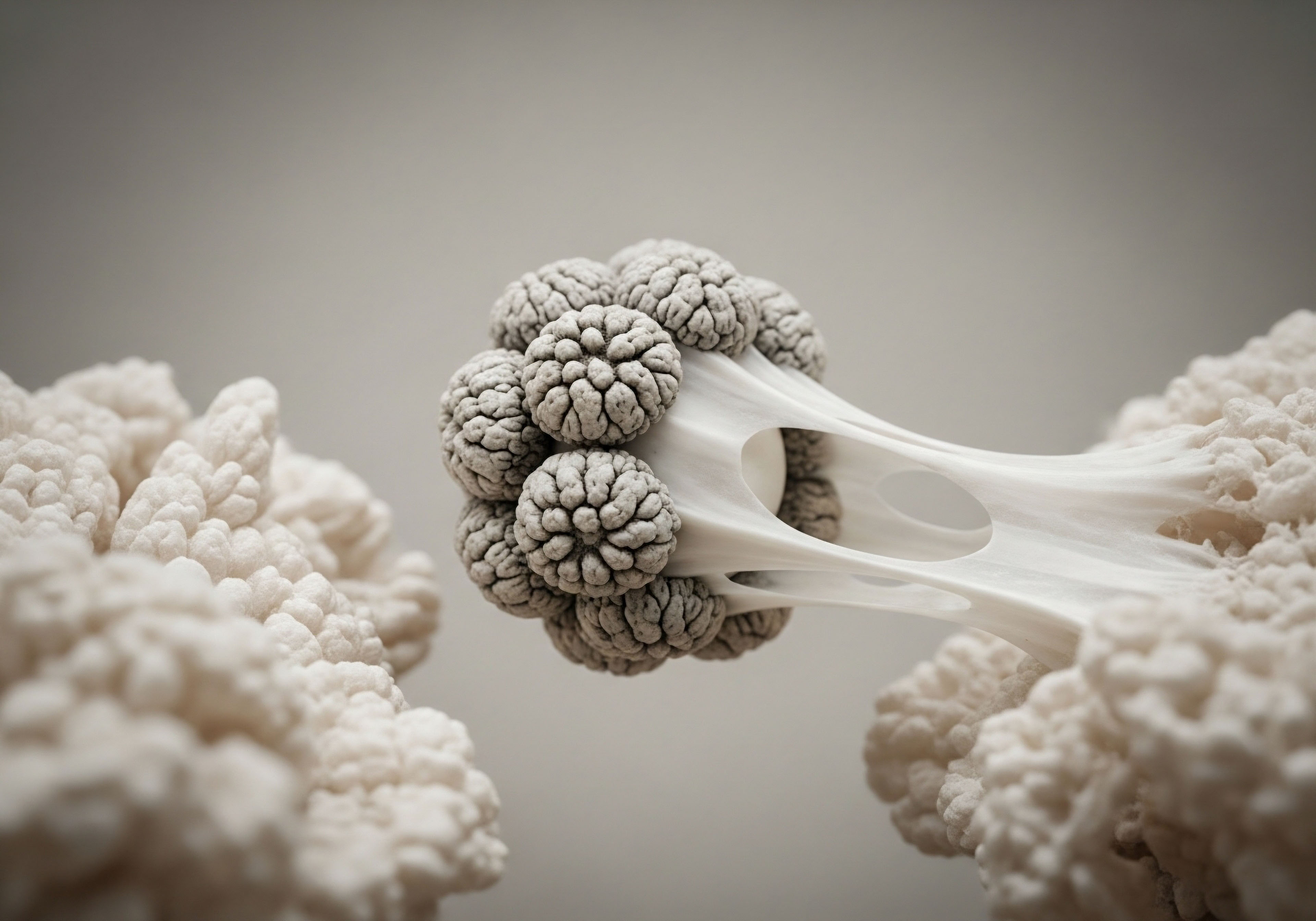

The Nocturnal Foundation of Daytime Dominance
Your capacity to command your day, to execute with precision, and to sustain peak cognitive and physical output is not solely a product of your waking hours. It is profoundly shaped by the silent, intricate processes that unfold while you sleep. Nightly hormonal mastery is the cornerstone of this daytime ascendancy. It is the intelligent calibration of your body’s internal chemistry during rest, setting the stage for unparalleled vitality and performance when the sun rises.
Consider the endocrine system as a sophisticated orchestra, with hormones serving as the instruments and conductors, each playing a vital role in the symphony of your physiology. During sleep, this orchestra performs a critical recalibration. Growth Hormone (GH), essential for cellular repair, muscle synthesis, and metabolic regulation, is secreted in pulsatile bursts primarily during deep non-REM sleep.
This nocturnal GH release is foundational for physical recovery, tissue regeneration, and maintaining a lean physique. When sleep architecture is compromised, GH secretion falters, directly impacting your body’s ability to rebuild and maintain itself, leading to diminished physical resilience and slower recovery from exertion.
Furthermore, the Hypothalamic-Pituitary-Gonadal (HPG) axis, governing reproductive health and influencing mood, energy, and drive, is significantly regulated by sleep patterns. Testosterone, for instance, exhibits a diurnal rhythm, with its highest levels typically occurring in the early morning hours, a direct consequence of nocturnal synthesis and release influenced by sleep quality and duration.
Inadequate or fragmented sleep disrupts this rhythm, leading to blunted morning testosterone levels. This hormonal deficit translates directly into daytime symptoms such as reduced libido, diminished motivation, increased fatigue, and a struggle to maintain focus ∞ the very antithesis of daytime dominance.
Cortisol, the body’s primary stress hormone, also follows a distinct circadian pattern, peaking shortly after waking to mobilize energy and gradually declining throughout the day. Effective sleep hygiene supports this natural cortisol rhythm. Disrupted sleep, however, can lead to a dysregulated HPA (Hypothalamic-Pituitary-Adrenal) axis, resulting in elevated nighttime cortisol levels or a blunted morning surge.
This imbalance interferes with sleep quality itself and contributes to daytime anxiety, impaired cognitive function, increased fat storage, and a weakened immune response. The body remains in a low-grade state of alert, hindering recovery and diminishing overall performance capacity.
Melatonin, the sleep-wake signaling hormone, orchestrates the body’s transition into rest. Its production is stimulated by darkness, signaling to the brain that it is time to prepare for sleep. Proper melatonin signaling ensures timely onset of sleep and supports the progression through sleep cycles, which are themselves crucial for the release of other vital hormones.
A disruption in this pathway, often caused by artificial light exposure at night or irregular sleep schedules, cascades into broader hormonal dysregulation, affecting GH release, testosterone production, and cortisol management.
The interplay between these hormonal systems during sleep forms the bedrock of daytime function. Neglecting nocturnal hormonal regulation is akin to building a skyscraper on an unstable foundation; the structure is destined to falter. The pursuit of daytime dominance, therefore, must commence with the intelligent management of the night. It is within the quiet hours that the essential biological blueprints for energy, cognition, mood, and physical prowess are drafted and refined.
“Disrupted sleep is not merely an inconvenience; it is a direct impediment to endogenous growth hormone secretion, blunting physical repair and metabolic efficiency.”


Engineering Your Sleep for Hormonal Supremacy
Achieving Nightly Hormonal Mastery requires a deliberate, systems-engineering approach to sleep. It moves beyond generic advice on “getting more sleep” to a precise understanding and application of the biological mechanisms that govern nocturnal hormone release and regulation. This involves optimizing sleep architecture, timing interventions, and supporting the body’s natural endocrine rhythms.

Foundational Sleep Architecture
The quality and structure of your sleep are paramount. Deep sleep (Stage N3 NREM) is where Growth Hormone is predominantly released. REM sleep is vital for cognitive processing, memory consolidation, and emotional regulation, indirectly influencing mood and stress hormone balance.
- Chronotype Alignment: Understanding your natural chronotype (whether you are an early bird or a night owl) allows for the strategic scheduling of sleep to align with your body’s endogenous circadian signals, maximizing the potential for restorative sleep cycles.
- Environmental Control: A cool, dark, and quiet sleep environment is non-negotiable. Darkness is essential for robust melatonin production. Lowering core body temperature, typically achieved through a cooler room and a warm bath before bed, signals to the body that it is time for deep rest, facilitating the onset of NREM sleep.
- Light Management: Minimize exposure to blue light-emitting devices in the hours leading up to bedtime. If unavoidable, utilize blue-light blocking glasses. Conversely, strategic exposure to bright light shortly after waking helps anchor your circadian rhythm, promoting alertness and supporting a healthy cortisol awakening response.

Hormonal Recalibration Strategies
Once the foundational sleep environment is established, specific strategies can be employed to directly influence nocturnal hormonal profiles.

Endogenous Support and Lifestyle Interventions
Your daily habits create the hormonal landscape of your night.
- Nutrient Timing and Composition: Consuming a balanced dinner, rich in complex carbohydrates and lean protein, several hours before bed can support stable blood sugar and provide substrates for nocturnal repair. Avoid heavy meals or excessive alcohol close to bedtime, as these disrupt sleep architecture and hormone release.
- Strategic Supplementation: Certain supplements can aid sleep and hormonal support. Magnesium L-Threonate, for example, has shown benefits in crossing the blood-brain barrier to support sleep quality. Glycine, an amino acid, can help lower core body temperature and improve sleep efficiency. Consider these as adjuncts to, not replacements for, foundational sleep hygiene.
- Exercise Timing: While regular exercise is vital for hormonal health, intense workouts too close to bedtime can elevate cortisol and body temperature, hindering sleep onset and quality. Aim for exercise earlier in the day.

Exogenous Optimization ∞ Hormonal and Peptide Therapies
For individuals with diagnosed hormonal deficiencies or those seeking to push the boundaries of performance, targeted therapeutic interventions can be game-changing. These protocols require careful medical supervision and are based on clinical diagnostics.
Testosterone Replacement Therapy (TRT): For men with clinically low testosterone, TRT can restore levels to a more optimal physiological range. When administered appropriately, it supports healthy diurnal rhythms, improves sleep quality, and enhances muscle mass, energy, and mood ∞ all contributing to daytime vitality.
Growth Hormone and Peptides:
| Therapeutic Agent | Primary Nocturnal Role | Daytime Benefit Link |
|---|---|---|
| Sermorelin / GHRH Analogs | Stimulates the pituitary to release endogenous Growth Hormone, particularly during sleep. | Enhanced muscle repair, improved body composition, increased energy, cognitive clarity. |
| GHRPs (e.g. Ipamorelin) | Directly stimulate GH release and can also influence ghrelin, affecting appetite and metabolism. | Accelerated recovery, improved metabolic function, potential effects on mood and cognition. |
| Melatonin (Supplemental) | Aids in sleep onset and synchronization of the circadian rhythm. | Improved sleep continuity, better alignment of cortisol and GH release patterns. |
These interventions are not mere shortcuts; they are precise tools for re-engineering biological systems when endogenous production is suboptimal or when seeking a higher level of function. Their efficacy is maximized when integrated with robust sleep hygiene practices.


The Strategic Deployment of Nightly Mastery
The decision to implement strategies for Nightly Hormonal Mastery is not arbitrary; it is a calculated choice based on diagnostic data, personal goals, and a clear understanding of expected timelines. The “when” of these interventions dictates their efficacy and safety.

Assessment and Diagnosis ∞ The Prerequisite
Before any exogenous hormonal or peptide therapy is considered, a comprehensive assessment is essential. This involves blood work to evaluate baseline hormone levels (testosterone, free testosterone, estrogen, LH, FSH, GH, IGF-1, cortisol, melatonin, thyroid panel) alongside sleep studies if indicated.
Understanding your current hormonal status and sleep patterns provides the objective data necessary to determine if interventions are warranted and which specific protocols will yield the greatest benefit. This diagnostic phase is critical for personalizing the approach and avoiding a one-size-fits-all strategy.

Timing of Interventions
The timing of therapies is as significant as their selection.
Lifestyle Adjustments: These should be implemented immediately and continuously. Improving sleep hygiene, refining diet, and managing stress are ongoing practices that support hormonal balance 24/7, with their most profound impact felt during the nocturnal recovery period.
Hormone Replacement Therapy (TRT): For men with confirmed hypogonadism, TRT is typically administered on a schedule that mimics natural hormone rhythms. This might involve daily injections, weekly injections, or transdermal applications, depending on the ester and formulation. The goal is to maintain stable, physiological levels throughout the day and night, supporting consistent recovery and daytime function.
Peptide Therapies: Peptides like Sermorelin and GHRPs are often administered via subcutaneous injection. The optimal timing for these is usually before bed or in the early morning hours, coinciding with natural GH release patterns and sleep cycles. For instance, a pre-sleep injection can amplify the endogenous GH pulse during deep sleep.
Melatonin: If used for sleep regulation, melatonin is typically taken 30-60 minutes before the desired bedtime. Its use is most effective when aligned with natural light cues and a consistent sleep schedule.

Expected Outcomes and Timeline
The manifestation of benefits from Nightly Hormonal Mastery is a progressive journey, not an instantaneous event.
Weeks 1-4 ∞ Initial Adjustments and Subjective Changes. Many individuals report improvements in sleep quality, reduced sleep onset latency, and a subtle increase in morning alertness. For those on TRT, early benefits in mood and energy may begin to appear.
Months 1-3 ∞ Tangible Physiological Shifts. Noticeable improvements in energy levels, cognitive function, mood stability, and physical recovery become more pronounced. For those utilizing GH-releasing peptides or TRT, enhanced muscle tone, improved body composition (reduced fat mass, increased lean mass), and greater workout capacity are often observed.
Months 3-6+ ∞ Sustained Performance and Resilience. The full benefits of hormonal recalibration manifest as sustained daytime dominance. This includes consistent high-level cognitive performance, robust physical endurance, accelerated recovery, and a general sense of biological vitality. This phase represents the establishment of a new, elevated baseline of physiological function.
Continuous monitoring through follow-up blood work and subjective self-assessment is vital to ensure protocols remain effective and aligned with your evolving physiology and performance objectives.

The Architect’s Mandate ∞ Command Your Chronos
Nightly Hormonal Mastery is not an aspiration; it is a biological imperative for those who refuse to accept the passive decline of aging. It is the ultimate expression of self-stewardship ∞ an active, informed commitment to engineering your biology for peak performance across all facets of life.
By understanding and strategically influencing the nocturnal hormonal symphony, you do not merely improve your sleep; you fundamentally redesign your capacity for daytime excellence. This is the vital intelligence required to transcend limitations and operate at the zenith of your potential.

Glossary

nightly hormonal mastery

growth hormone

sleep architecture

sleep quality

testosterone

daytime dominance

sleep hygiene

nightly hormonal

circadian rhythm

trt

hormonal mastery




